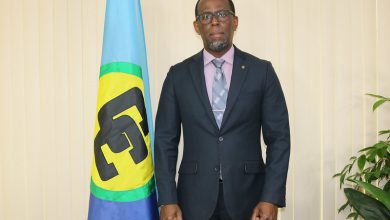Your Excellency Sir Cuthbert Sebastian, Governor-General of St. Kitts and Nevis
Dr. Denzil Douglas, Prime Minister of St. Kitts and Nevis
Honourable Heads of Government of the Caribbean Community
Members of the Federal Government of St. Kitts and Nevis
Mmembers of the Nevis Island Assembly
Dr. Edwin Carrington, Secretary-General of the Caribbean Community (CARICOM)
Mr. Dwight Venner, Governor of the Eastern Caribbean Central Bank
Members of the Diplomatic Corps
Hon. Justice Satrohan Singh
Your Lordship Justice Neville Smith
Government Officials
Representatives of Private Sector Institutions
Government and CARICOM officials
Members of delegations
Distinguished Ladies and Gentlemen.
It is with a keen sense of history that I participate in this 11th CARICOM Inter-Sessional meeting. It is my first appearance as the leader of the Government of the Commonwealth of Dominica, and I do so with full cognisance of the role that my predecessors have played in meetings of this kind.
At the outset, let me offer warm congratulations to the Hon Prime Minister of St. Kitts and Nevis Dr. Denzil Douglas for the outstanding victory he scored in the recently concluded general election in this country.
The emphatic nature of his party’s victory is a testimony to a competent and successful term of administration over the last five years. For my part, I look forward to working with him and the government of St. Kitts and Nevis, at a bi-lateral, sub-regional and regional level, on matters which will move forward both of our countries as well as other countries within the OECS and CARICOM.
Mr. Secretary-General, Excellencies, ladies and gentlemen, first, let me declare my commitment to regional integration, for which I have fought most of my life.
My perspective is that of a Caribbean man with responsibility for development in a particular area of the Caribbean. It is my hope that the developments taking place in Dominica will continue to be in harmony with those in other parts of the region and that we can all move forward to together to build this Caribbean nation, which is unique among the several civilisation of the world.
Ladies and Gentlemen, I have read the documents presented to me with great care and I may be considered presumptuous if I may express my impatience with the speed at which we are proceeding in relation to some of these matters.
Firstly, it does not require a rocket scientist to determine that individual micro-states in the Caribbean stand little chance of achieving the aspirations of their people if they stand alone and operate like Lebnitzian Monads, locked up in themselves and incapable of relating to others.
Caribbean leaders have talked the talk of union and its benefits to the entire region from the halcyon days of the Caribbean Labour Congress in 1947. Over a half century later our leaders are still drearily repeating the same cliches about unity, the sole difference being that these statements are now dressed up in the bureaucratic jargon that seems to be a fashion of the new millennium.
Take for example, the freedom of movement of persons. In 1957 at a Pre Federal Conference in Trinidad and Tobago, this matter was hotly debated by the leaders of our region, who agreed that it was a sine qua non for regional integration.
At that time the vocabulary used was that of a Federal Union. Little has been done by way of positive governmental action.
Looking at the Caribbean today, ordinary men and women have been moving from island to island on their own volition, in the majority of circumstances illegally.
They have been living, working, loving and marrying persons from other islands and are happily integrated. This aspect of integration is taking place in spite of the ineffectiveness of the leaders of this region in taking the necessary steps to bring it to fruition.
Our leaders must not be obstacles to what ordinary men and women in the Caribbean want, that is to be associated with each other at work and at play. We must take the necessary steps to legally effectuate this reality.
It is fundamental that governments exist to serve human beings and not to deal in abstractions. Let us release the energies of the people of this region in this ever expanding world of trade liberalisation and globalisation by freeing them to live and work wherever they choose.
I myself am grateful to the Prime Minister of Antigua and Barbuda which has permitted thousands of Dominican nationals to reside in Antigua and I personally know of no problem of dislocation which has been created by their presence there.
Indeed harmony prevails among the Dominican and Antiguan populations in Antigua and Barbuda and the Dominicans have helped to motor the developmental process in that island.
Let us therefore move forward without any further foot dragging, procrastination or prevarication.
In short, Ladies and Gentlemen, the position of the new Dominican Government is that the integration of a people at the personal level is a prior condition for the success of economic and other institutional integration.
Turning now, Mr. Chairman, to the issue of the global economy, it is obvious to me that a considerable area in the approach to economic integration within the Caribbean region has been influenced by the evolution of the European Union and there is much to be gained from seeking to foster ties with that international organisation.
The European Union came into existence as a countervailing force to United States economic power, because it was recognised that individual nation states, acting alone, were doomed to be subjects in a hegemonic relationship with raw United States power.
We can continue to learn important lessons from the Europeans in their integration process and how their position was strengthened with respect to economic blocs external to themselves.
This recommendation, ladies and gentlemen, is not a proposal for CARICOM to become an appendage of the European Union. Rather, I submit that it is a practical and commonsense approach to balancing the influence of the United States of America as the premiere power within the Western Hemisphere.
The asymmetrical relationships caused by this geo-political reality require an approach of triangulation among Europe, the Western Hemisphere and the Caribbean.
Strategic positioning of CARICOM must not be fixed in concrete, because all policies and economies are dynamic; there is always continuous change. We must therefore prepare for economic revivals in Africa or Asia and our policies must be flexible enough to deal with these relationships as required by political and economic interests of the region.
Dominica is forced by geographic reality, historical necessity and cultural and social practice to seek, within a strengthened CARICOM, a special type relationship with Europe, which can only bolster our overall position as a united region.
In short, Mr. Chairman, the new Government of Dominica, in so far as regional integration is concerned, takes a position that regional integration is a process conducted by people for their own
benefit and that prior to institutional integration, must be the integration of human beings.
Failing this, I submit, 50 years from now the same discussions would be taking place, while we are in our graves, by future generations of CARICOM leaders, perhaps using a more fashionable vocabulary suited to that time. The institutional changes will come with great speed when we are integrated as a group.
Mr. Secretary-General, Distinguished Ladies and Gentlemen, the new Government of Dominica will, in due course, elaborate its views on various aspects of institutional integration as proposed by earlier meetings of this body. This is not the time and place for it. However, I do wish to thank you for the patience and courtesy which you have extended to me in listening to my inaugural remarks as Prime Minister of the Commonwealth of Dominica.
I look forward to fruitful cooperation with all of my colleagues in this body and I give them the assurance that any one of you can call on me at any time and I will be prepared to give all of the assistance that I can, in any cause or in any effort to further the interest of the people of any island or of this region.
I am a Caribbean man from beginning to end and thus my commitment to this body and its purposes are unqualified and absolute.
Thank you, Mr. Secretary-General.






